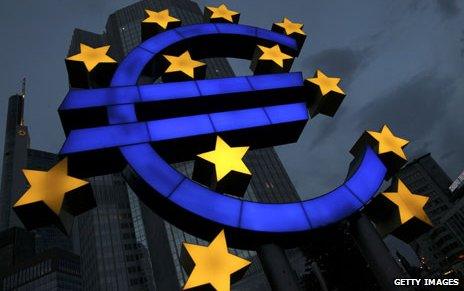Eurozone banking union that works for Britain?
- Published
- comments

At about 04:45 Brussels time this morning, European Union finance ministers made a bit of EU history.
Their agreement to give the European Central Bank the power to supervise the eurozone's bigger banks sounds horribly technical and dull. But it matters, in helping the eurozone to move a little further away from the cliff edge, while perhaps mapping a future for the UK in an EU increasingly dominated by currency union members acting as a unified bloc.
The deal may represent the most significant new transfer of national powers to a eurozone institution since the crisis erupted in the currency union three years ago - and, for many, it represents the first step towards the kind of centralisation of decision-making that's necessary for the eurozone to survive.
And it includes a possible blueprint for how the UK might avoid becoming too marginalised as a member of the European Union, should the eurozone evolve into a United States of Europe within a wider, looser EU structure.
So it provides a possible answer to those who believe that one consequence of the eurozone doing what it needs to avoid fracture - to integrate politically in a deep sense - is that the UK will be propelled remorselessly towards the EU's exit.
Here is the niggly detail.
The ECB will take responsibility for supervising bigger banks, those with assets (loans and investments) of €30bn or whose assets represent more than a fifth of a nation's economic output. That is about 200 banks initially.
Significantly, loads of French banks will be supervised by the ECB, but few German banks (because its banking industry is more fragmented).
That looks like a victory for Mrs Merkel, except that the ECB will have the power to intervene at smaller banks if it sees problems - so Mr Hollande's dignity is preserved.
Those EU countries like the UK not in the eurozone can opt to join this so-called banking union. They can opt to have their banks supervised by the ECB.
The UK won't cede its national banking supervision powers to the ECB, but other eurozone "outs" might (although Sweden and the Czech Republic seem, like the UK, to have decided to stick with their national supervisors, for the time being at least).
As for the Chancellor, George Osborne, he had conflicting instincts in the negotiations. On the one hand, he didn't want to block banking union for the rest - because he believes it is in Britain's interest to help bring calm and stability to the eurozone.
On the other hand, he has the commercial interests of the UK's banks and businesses to protect, and he fears that a more closely-knit eurozone would seek to rig the single market to the detriment of Britain.
He achieved two forms of protections for British commerce.
On the one hand, the European Central Bank has agreed that it will not discriminate against any EU member state in the way that it uses its supervisory powers. The fear was that in setting liquidity or capital rules for the banks under its umbrella, it could somehow tilt the competitive playing field away from London.
As for the outfit that makes regulations for the EU's banks, the European Banking Authority, it will introduce a "double majority" voting system - whose effect should be to preserve a voice for the UK in the making of banking rules.
What this means is that when a new rule is agreed, there will have to be a majority by voting weight of all EU members, plus a simple unweighted majority of the eurozone "outs" and the "ins".
Or to put it another way, if a majority of the eurozone "outs" don't like a new banking rule, they can block it - which limits the voting force of eurozone members acting in unison.
Although this double-majority voting system for the EBA sounds boringly procedural, it could prove to be very significant.
It could provide an important blueprint to preserve the UK's voting voice and weight on the future of the single market, as and when the eurozone evolves into an even more unified political bloc. It implies that the UK might be able to co-exist in the European Union with a currency union that becomes a political union.
But perhaps we are getting ahead of ourselves. Because although the first steps towards banking union agreed early this morning are important, they do not guarantee the eurozone's survival.
If the ECB turns out to be any good at banking supervision, it might in the future prevent eurozone banks becoming as dangerously bloated as those in Ireland and Spain. It might prevent eurozone states going to the brink of bankruptcy as a result of the recklessness of their respective banks.
But, for the avoidance of doubt, eurozone members have not merged their financial resources to provide a single pool of money to rescue banks, or to insure depositors against losses.
The Germans are not even allowing the new bailout fund, the European Stability Mechanism, to put money into Spanish banks - for example - without that capital simultaneously becoming a liability of the over-extended Spanish state.
Or to put it another way, banking union might be a precursor to the kind of fiscal and balance-sheet union that is widely regarded as the sine qua non of eurozone survival, but that supposedly vital financial union has not happened yet. To put it yet another way, Germany is not ready - and may never be ready - to provide implicit insurance and underwriting for loans and investments made by Spanish banks, or Italian banks or French banks.
And another word of caution:
Banking-union lite has probably surmounted its biggest hurdle, with last night's agreement of finance ministers. But it cannot become a reality until approved by Germany's parliament. Recent history indicates it would be foolhardy to bank the acquiescence of German parliamentarians in advance of the fact.